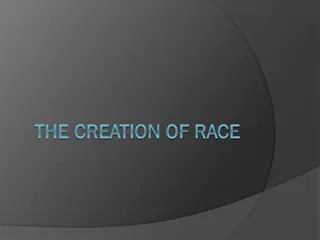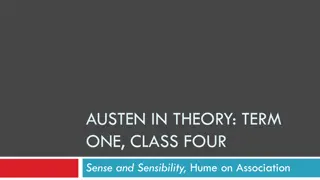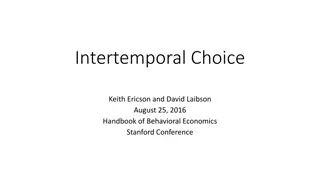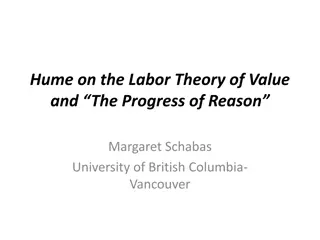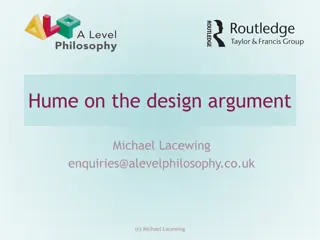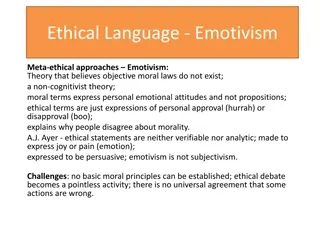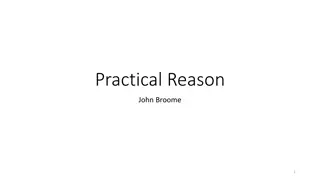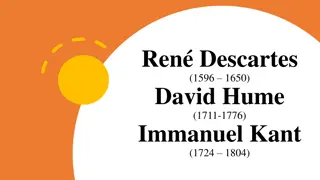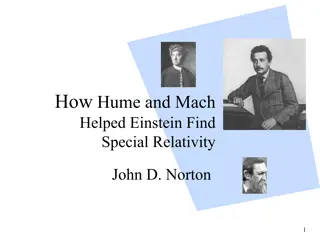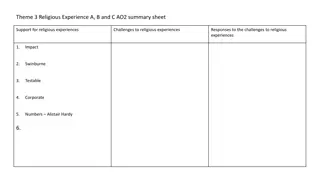Austen in Theory
The housekeeping information for the Austen in Theory course, including paper deadlines and prompt details. Students will explore Austen's novels in relation to philosophers such as Locke, Hume, Smith, Burke, or Wollstonecraft.
1 views • 28 slides
Liberty & The Age of Enlightenment The American Battlefield Trust
The Age of Enlightenment, with its emphasis on natural law, liberty, progress, and constitutional government, greatly influenced American thinking and the Revolutionary War. Key figures like John Locke and Sir William Blackstone contributed ideas of social contract and law that shaped American gover
2 views • 15 slides
Exploring the History of Race Classification and Racial Categories
Delve into the historical context of race classification through the lens of notable figures like David Hume and Johann Friedrich Blumenbach. Uncover the evolution of racial categories in U.S. Census data, from 1850 to 1930. Reflect on the implications of these classifications in society and learn a
0 views • 19 slides
England's Restoration Period and the Rise of the British Empire
England saw significant historical events during the Restoration Period and the eighteenth century. From Charles II's restoration to the Glorious Revolution, the Act of Union of 1707, and the rise of British dominions worldwide, this era marked political stability, literary contributions, and the gr
1 views • 22 slides
Exploring Sense and Sensibility: Hume's Theory of Association
Delve into the connection between Sense and Sensibility in Austen's works and Hume's theory of association. Hume's emphasis on immediate experience aligns with Austen's plots, showcasing a coherence in their perspectives. The principle of connection between thoughts and ideas is highlighted, emphasi
1 views • 17 slides
Intertemporal Choice and Behavioral Economics Overview
Explore present-focused models, empirical regularities, and open questions related to intertemporal choice in behavioral economics. Concepts like hyperbolic discounting, dual-self models, psychometric distortions, and myopia are discussed using insights from prominent figures like David Hume, Plato,
0 views • 37 slides
Hume's Views on Labor Theory of Value and Reason's Progress
Hume's perspective on the Labor Theory of Value challenges traditional views, suggesting he may not have adhered to it like Adam Smith. Contrary to his critics, Hume valued merchants, advocating for higher wages and reduced inequality. He embraced liberal ideas promoting freedom, equality, and virtu
0 views • 23 slides
Capturing Solar Eclipse Moments at Maynooth Green Campus
In 2015, Maynooth Green Campus organized a viewing event for a rare solar eclipse, despite the cloudy Irish skies. Attendees observed the event from Hume Rooftop, enjoying a convivial atmosphere with tea and coffee. The event featured discussions on solar energy and the impact of fossil fuel emissio
0 views • 11 slides
Analyzing Hume's Critique of the Design Argument by Michael Lacewing
The design argument contends that the intricate order in the universe suggests a designer. Michael Lacewing delves into Hume's objections to this argument, highlighting how the analogy between human-made objects and the universe falls short in establishing a similar cause. Hume questions the logic o
0 views • 10 slides
Understanding Emotivism: A Non-Cognitivist Theory in Ethics
Emotivism is a meta-ethical theory that posits the absence of objective moral laws, suggesting moral terms express personal emotional attitudes rather than propositions. Influenced by philosophers like A.J. Ayer and Hume, it challenges the existence of basic moral principles and universal agreement
0 views • 23 slides
The Untold Stories of UF.COM and Wilmont Gardens
Discover the deep interconnections in the history of UF.COM and Wilmont Gardens through key figures like Dr. Alice Rhoton-Vlasak, George Thomas Harrell, and Harold Hume. Uncover the evolution of the University of Florida from its humble beginnings to a renowned institution, intertwined with pivotal
0 views • 26 slides
Exploring the Ambiguity of Reason in Philosophy Through Historical Perspectives
The ambiguity and complexity surrounding the concept of reason are delved into through the historical lenses of John Broome and David Hume. From the early uses of "reason" in English to its normative implications in moral philosophy, this exploration sheds light on the multifaceted nature of reason
0 views • 21 slides
A Dive into Philosophical Thought: Descartes, Hume, Kant, and More
Explore the intellectual landscape of renowned philosophers like René Descartes, David Hume, Immanuel Kant, and other influential figures such as Nicolaus Copernicus and Martin Luther. Delve into Descartes' meditations on doubt, the nature of the human mind, and the example of wax, reflecting on fo
0 views • 34 slides
The Influence of Hume and Mach on Einstein's Discovery of Special Relativity
Einstein's study of Hume and Mach played a crucial role in his 1905 discovery of special relativity. By challenging traditional concepts of space and time and emphasizing the importance of grounding concepts in experience, Einstein was able to revolutionize our understanding of the universe. Through
0 views • 30 slides
Understanding Religious Experiences: Support and Challenges
This content delves into religious experiences, offering support from scholars like Hume and Swinburne and presenting examples such as St. Teresa of Avila. It explores the impact, Swinburne's perspective, testability, and more, while also addressing challenges and responses. Additionally, it highlig
0 views • 15 slides


